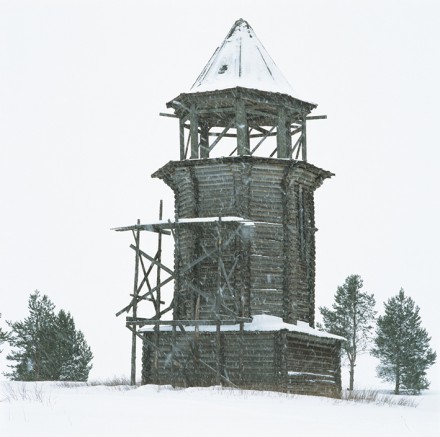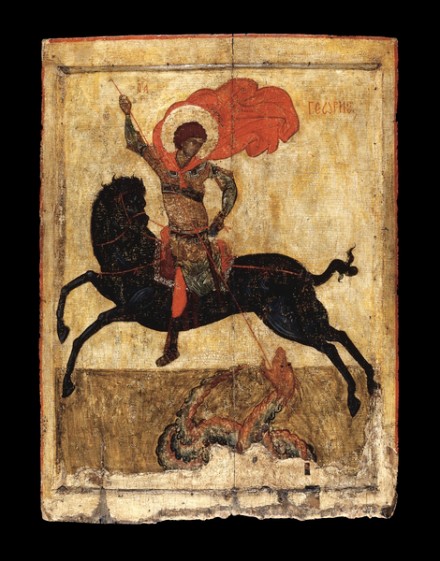Black George
Saturday, June 20th, 2009On a recent visit to the British Museum I came across this beautiful icon.
It was found in 1959 in a small village in the district of Ilinsky on the Pinega river in Northern Russia by Maria Rozanova, wife of the prominent dissident author Andrei Sinyavsky. It was being used to shutter a barn window. When found all that was visible was an eighteenth century folk painting. Later in Moscow, under the hands of a professional restorer, various layers were stripped off to reveal this extraordinary image of St George slaying a dragon. Experts dated it to the end of the fourteenth century and attributed it to an artist from Pskov. St George sits astride a black rather than the usual white horse, hence Black George, cooly lancing a dragon in the mouth. The red cloak encircling and billowing behind his halo gives him flight.
When in 1973 Sinyavsky and his wife were allowed to leave the Soviet Union they were able to take their possessions with them. The British Museum purchased the icon from them in 1986.
In his book Ivan the Fool Russian Folk Belief Andrei Sinyavsky (translated by Joanne Turnbull and Nikolai Formozov published by Glas Moscow 2007) tells us that……. In Old Russia George, like Nikola, had two feast days, April 23rd – Spring Egory, and November 26th – Cold Egory: important dates in the agricultural calendar marking the beginning and the end of summer labours. On Egoryâs day in spring, the peasants began to plough the fields and sow the first spring crops. The weather on that day was considered an omen. Common folk sayings went like this: âFrost on egory means millet and oats.â Or: âDew on Egory means good millet.â Or: âIf it rains on Yuri, the cattle will have an easy year.â………everything in nature begins with spring Egory………
Yuri, get up early and unlock the earth,
Let out the dew for a warm summer,
And a riotous wheat harvest….
I visited the Pinega river in search of wooden churches in February 2005.
Diary entry 26th Feb 2005 – Early start – the sun (red, beauteous & wondrous) has just risen – the landscapes tingles with sparkling frost – we pass four lads setting off to the forest with an auger, fishing tackle and a kettle – we drive over the Pinega river and through the forest – the road twists and turns and careful Leonide drives with caution, 80 km and two and a half hours later we arrive at Pirenem to learn that itâs beautiful 17thC church which had stood on the embankment overlooking the river burnt down twenty years ago (my reference book was printed in 1976) – do the other two churches beside the Pinega river survive – at Yedoma I am relieved to spot the church in the distance across the river – a young fellow tells us the route to the church is only suitable for horses – Leonide sees a horse and runs off to make arrangements with its owner – Slava fixes a sleigh to the horse and Alex and I (Leonide stays with his YA3) are soon on our way – in my excitement to photograph Aliscaâs (the horse) backside I lose my balance and tumble into the snow – the ride is wonderfully exhilarating – on arrival in the village we learn that the church is a kilometre further on and that the snow will be up to our waists – one of the five winter inhabitants of Yedoma an old man in need of cosmetic dentistry kindly offers us two pairs of skis which we gratefully accept – mine are not a matching pair and the fixings are not the latest but who cares – Alex sets off at quite a pace and Slava gamely follows in his felt boots sinking deeply into the snow whenever the frozen crust breaks - I proceed cautiously but not cautiously enough and soon topple, floundering like an upturned beetle – I eventually right myself and continue – before reaching the church I have toppled a few times more and arrive dressed as a snow man – the fully extended legs of my tripod sink into the snow but enough sticks out to take the camera – the next trick is manoeuvring around a tripod with barely controlled skis – the Church of St Nicholas (1700) is without the stunning tent roof shown in the photograph published 1976 but the bell tower standing to the side looks handsome in the gently falling snow -

 Bell Tower Yedoma February 2005
on our way back to the sleigh Alex asks Slava to follow me and to pull me out when necessary – Iâm pleased to say it wasnât necessary – Slava is a good looking 25 year old with blue eyes and ruddy cheeks, he is married with a two month old daughter – he works as a truck driver but work is difficult to come by – his last employer (the bastard) strung him along for three months without paying him even the pittance he had agreed – Leonide has been told that the Church of the Prophet Elijah (17thC) at Verkola still stands so we pay Slava (generously) and set off – the church is sited above the Pinega river near an old monastery – a monk chopping wood gives us directions – the church has been restored, no doubt by the enthusiastic monks, in a very DIY fashion and the double glazing wide boy who sold them the replacement windows was obviously not cognizant of the fact that he was dealing with a 350 year old Grade 1 listed building – at least the weather has been kept out for a few more years.
ââ«â
